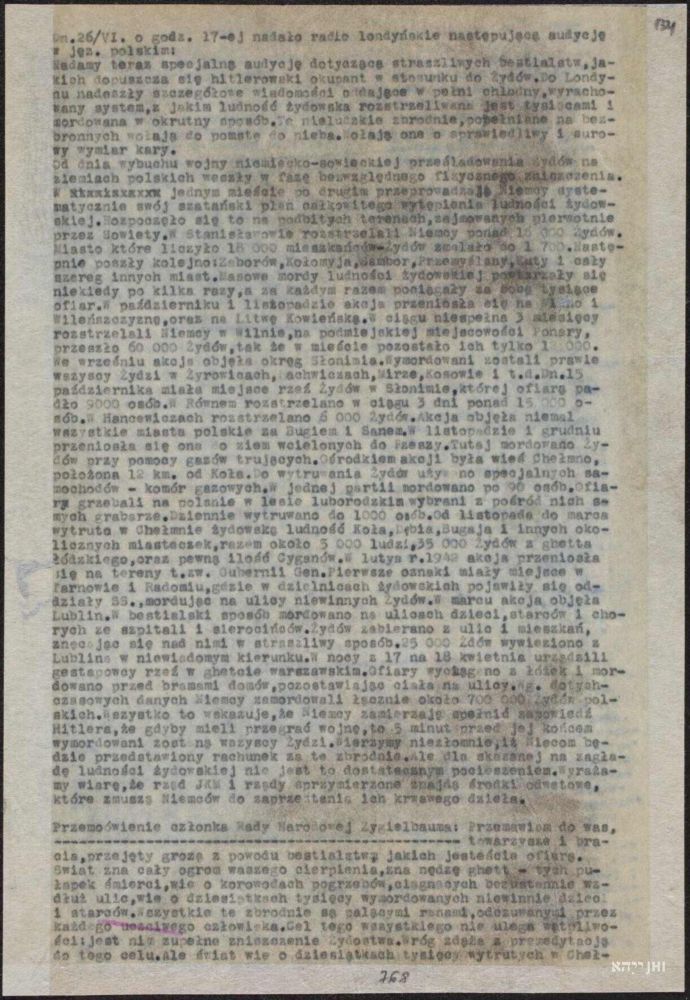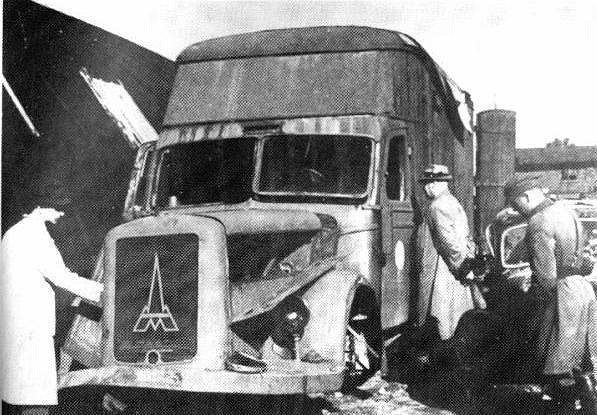- News
- Events
- Oneg Shabbat
- Collections
- Research
- Exhibitions
- Education
- Publishing Department
- Genealogy
- About the Institute
- Bookstore


“Everything that we know well was told: Słonim and Vilnius, Lviv and Chełmno, etc. For many months we felt sorry that the world was deaf and mute in the face of our tragedy, unparalleled in history. We had a grudge against the Polish public opinion, against the agents in contact with the Polish government, that they did not provide [information] about the slaughter of Polish Jews, that the world did not know about it. We accused Polish factors of deliberately ignoring our tragedy, lest it overshadow their own tragedy.
All [our] interventions have, apparently, finally reached their end. In recent weeks, the English radio has constantly broadcast news about the cruel abuse of Polish Jews: Chełmno, Vilnius, Bełżec, etc. Today, an abbreviated report on the situation of Polish Jews was given and it was said that 700,000 Jews were murdered in Poland. At the same time, revenge was announced and brought to justice for the violence committed”. [1]

Four months earlier, in February 1942, members of Oneg Shabbat learned from Szlama Ber Winer about the mass murders of Jews in Chełmno on the Ner (Kulmhof), carried out with the use of trucks equipped with a system for pumping exhaust fumes into a trailer. The shocking, almost unbelievable story of Szlama confirmed the worst assumptions of Ringelblum's associates: the Germans began the systematic destruction of the European Jewish population.
From then on, the goal of Oneg Shabbat, in addition to documenting the genocide, was to inform the world about the tragedy taking place far behind the front lines. London was also informed about German crimes in Poland by Bund party activists – the broadcast was probably based mainly on Bund materials, but information from Oneg Shabbat, provided through the Home Army, also reached the West at that time.
On June 26, 1942, the members of the group listened to a broadcast (the transcription was in the Ringelblum Archive), which spoke about the mass murders in Ponary near Vilnius, started in 1941, about the extermination of Jews from Stanisławów and many smaller towns beyond the Bug and San, belonging to Poland before the war.
“Jews were murdered here with the help of poisonous gases. The center of the action was the village of Chełmno, located 12 km from the town of Koło. Special cars – gas chambers – were used to poison the Jews. 90 people were murdered in one party. The victims were buried in a clearing in the Luborodzkie forest by gravediggers selected from among them. Up to 1,000 people were poisoned daily.
From November to March, the Jewish population of Koło, Dębice, Bugaj and other nearby towns were poisoned in Chełmno, together about 5,000 people, 35,000 Jews from the Łódź ghetto, and a certain number of Gypsies. In February 1942, the operation moved to the so-called Gen. Governorate." The number of 700,000 murdered Jews was given – the estimate of the Oneg Shabbat group at that time.
![gehenna_zydow_odpis.jpg [149.58 KB]](https://www.jhi.pl/storage/image/core_files/2021/3/5/d840fa7fafd9e22cfb26fbc2eae7886f/jpg/jhi/preview/gehenna_zydow_odpis.jpg)
The program was also attended by Szmul Zygielbojm, Bund activist, member of the National Council at the Polish government-in-exile in London: “I am speaking to you (...) comrades and brothers, terrified by the cruelties you are a victim. The world knows the enormity of your suffering, it knows the poverty of the ghettos – these death traps, it knows about the processions of funerals constantly dragging along the streets, it knows about tens of thousands of innocently murdered children and old people. All these crimes are burning wounds felt by every honest person”.
“A very sensational news has reached the ghetto today,” wrote Eliasz Gutkowski, the second secretary of the Ringelblum Archive, who helped to prepare the most important reports of Oneg Szabat, in his diary on June 27, 1942. – “Yesterday, on Friday, at five in the morning, the London radio broadcast a special program about the disappearance of Jews in Polish and Russian territories. The names of cities (such as Vilnius, Rivne, Hancewicze and many others) are given with numbers that amount to tens of thousands of victims. The broadcast ended with a call to Jewish society [no text] and a deep faith that the moment of deliverance and revenge is near.
This means that at last our excruciating sufferings and pains, as well as [information] about our countless victims, reached the wider public around the world! Can we hope that our situation will change a little for the better now? Will the slaughter and the sending of thousands of our brothers and sisters "in an unknown direction" be stopped? Maybe… although it's not very likely. It's also possible that it also has an [illegible] effect, but anyway we are a toy in the hands of murderers!.” [2]
![logos_TaubePhilanthropies.png [7.41 KB]](/storage/image/core_files/2020/12/11/f10aa2f8473e22e198a5258cd5f57e7d/png/jhi/preview/logos_TaubePhilanthropies.png)
Project co-financed by Taube Philanthropies.
Footnotes:
[1] Emanuel Ringelblum, Kronika getta warszawskiego, Warsaw 1983, p. 395–396. See. S. Kassow, Kto napisze naszą historię?, ed. Grażyna Waluga, Olga Zienkiewicz, Wydawnictwo Żydowski Instytut Historyczny, Warsaw 2017, p. 498.
[2] Eliasz Gutkowski, Dziennik z getta warszawskiego, in: Archiwum Ringelbluma, v. 23. Dzienniki z getta warszawskiego, ed. Katarzyna Person, Zofia Trębacz, Michał Trębacz, transl. Sara Arm et al., Warsaw 2015, p. 366.